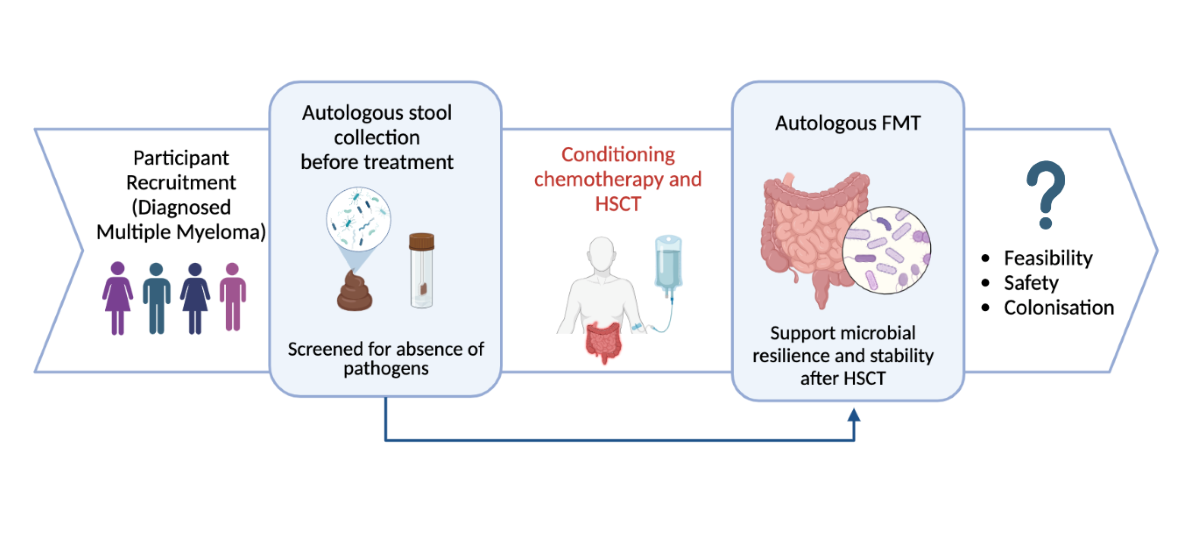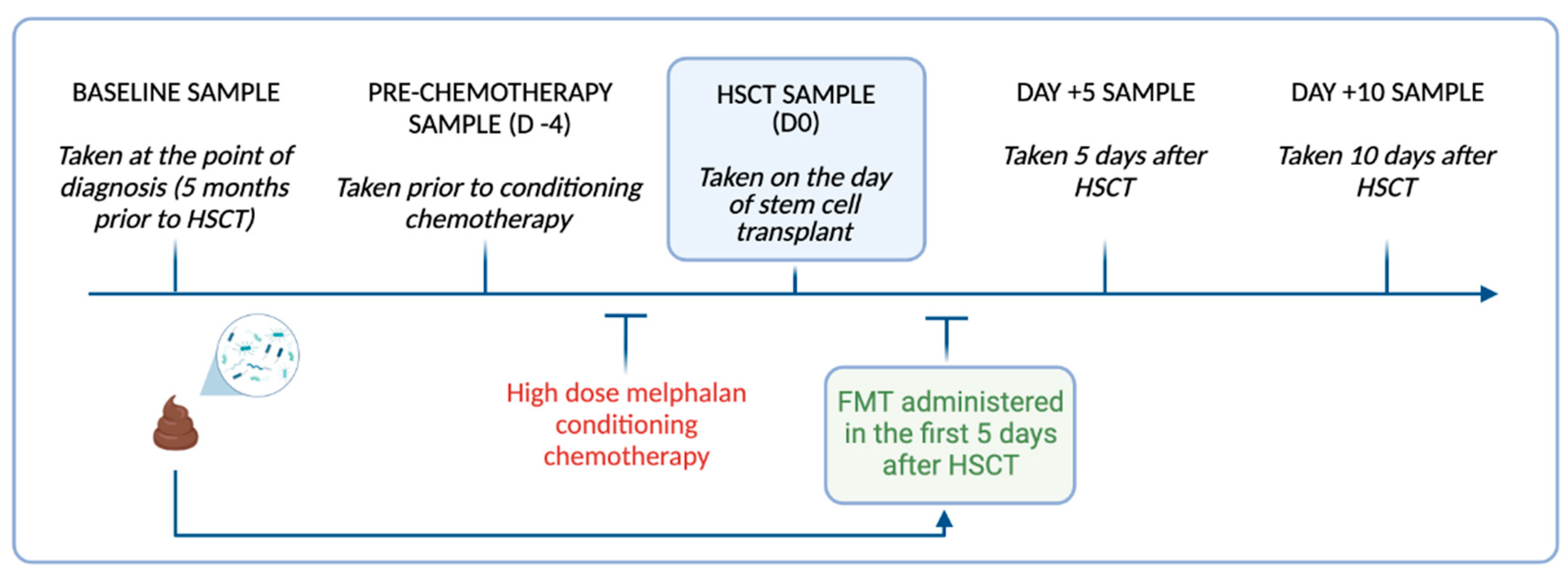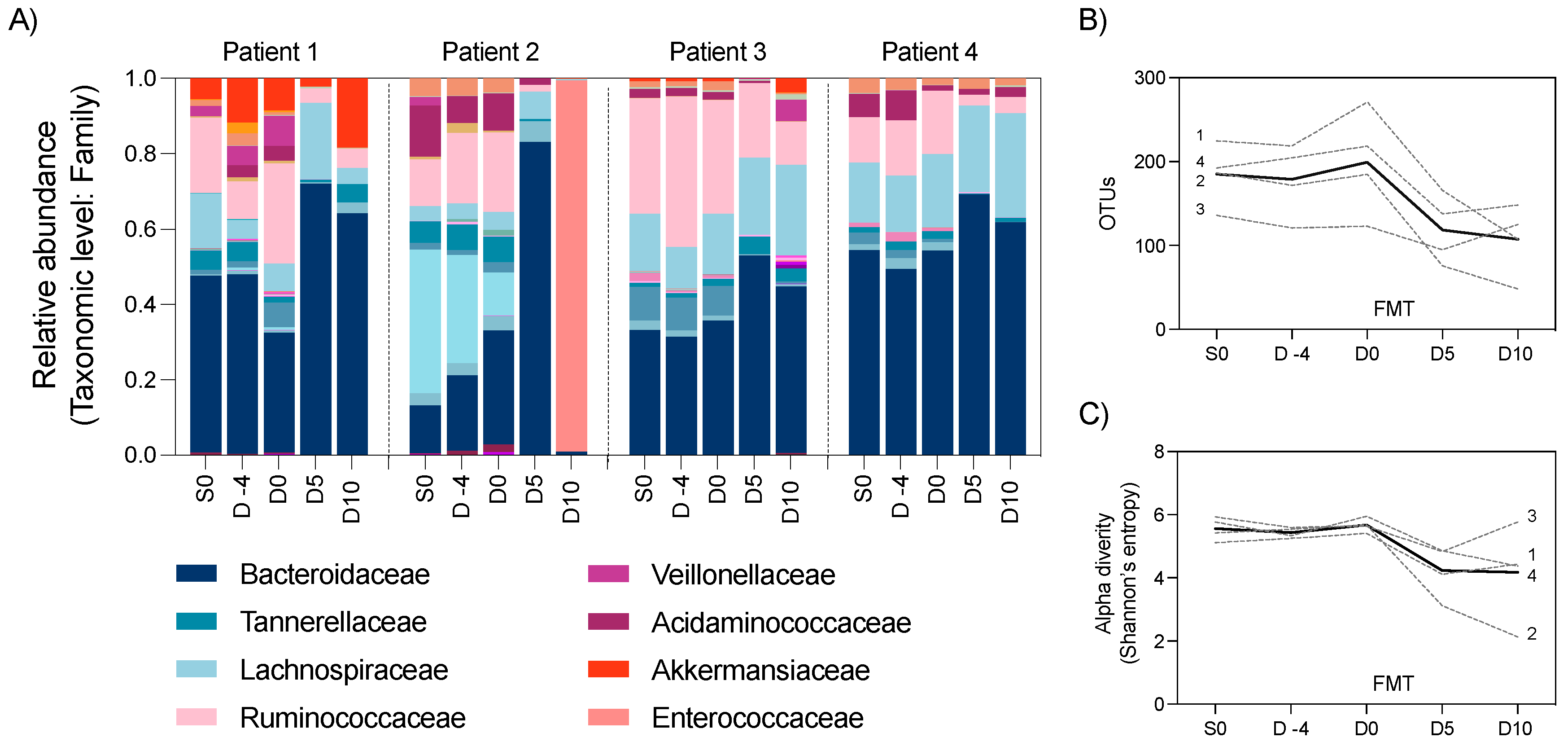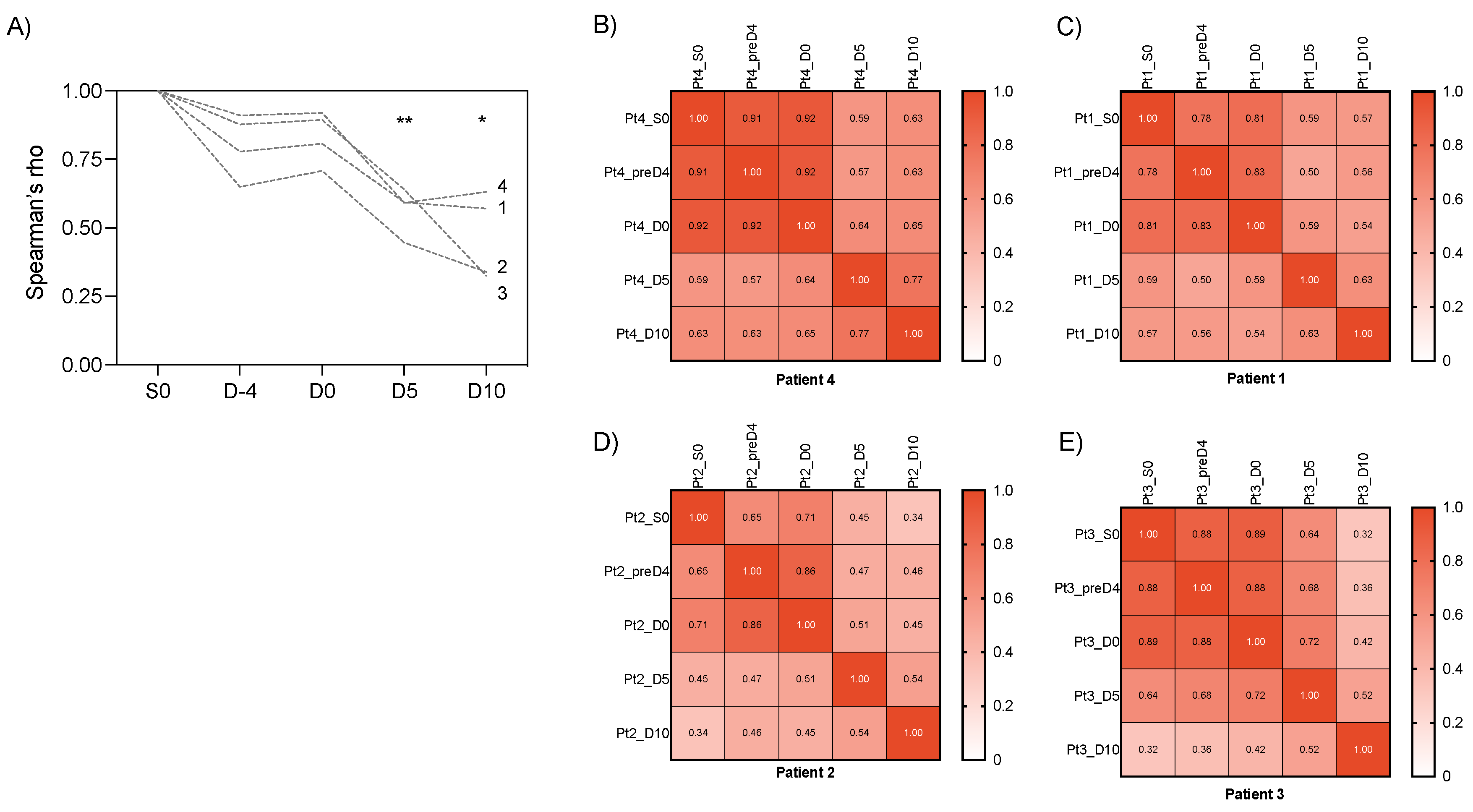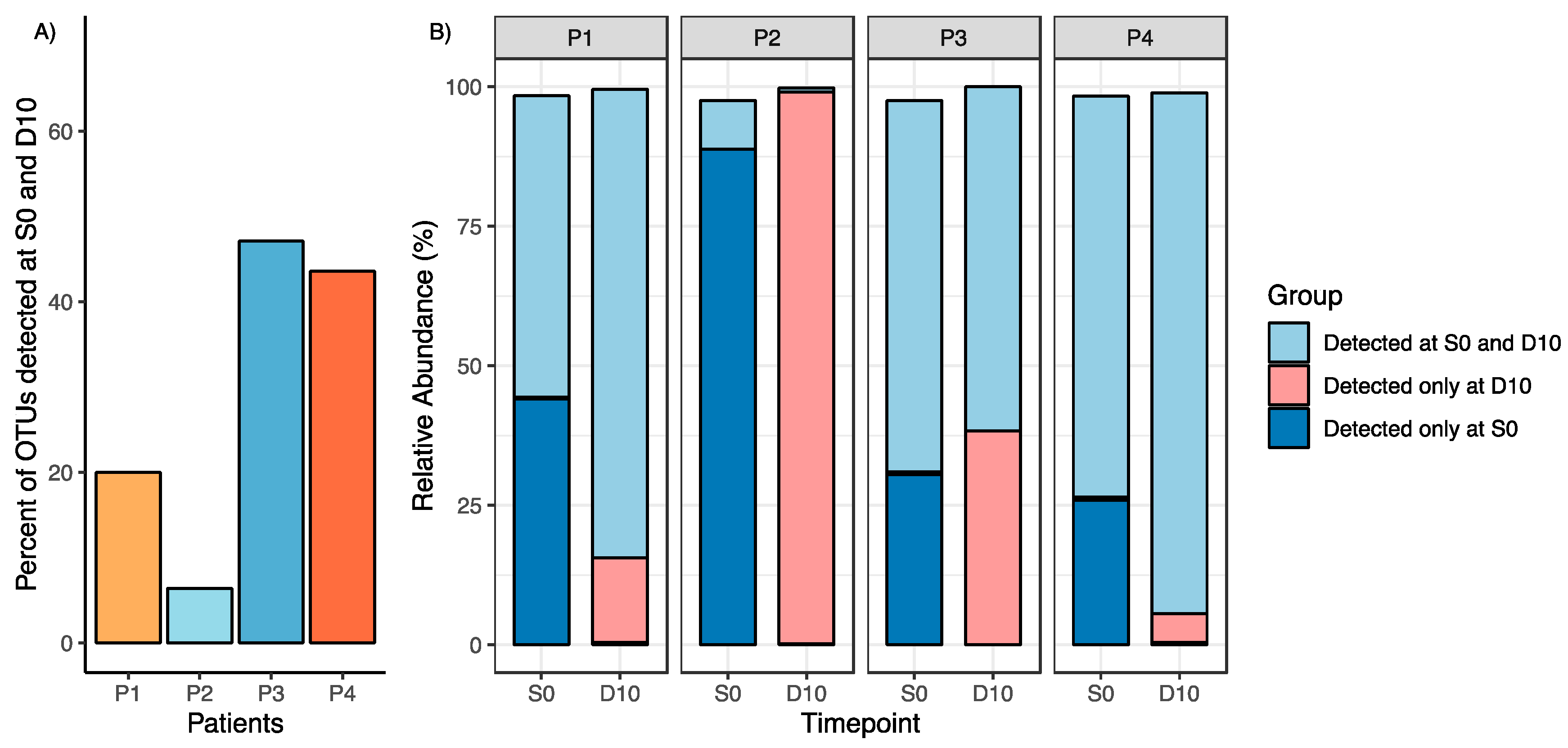1. Introduction
Haematopoietic stem cell transplantation (HSCT) is a curative approach used to treat a variety of blood cancers. It involves the use of high dose chemotherapy (e.g. melphalan), and in some cases, total body irradiation (TBI), to ablate malignant blood cells, followed by haematopoietic and immune reconstitution using healthy haematopoietic stem cells collected from either the patient (autologous-HSCT) or a major histocompatibility complex (MHC)-matched donor (allogeneic-HSCT). While often curative, both autologous and allogeneic HSCT are associated with a range of acute and chronic complications including infection, diarrhea, malnutrition and graft-versus-host disease (GvHD) [
1,
2,
3]. These complications drastically impact quality of life, require intensive (often in-patient) supportive care and worsen long-term prognosis [
4,
5,
6,
7].
The aetiology of HSCT-related complications is largely related to the damaging effects of chemotherapy and TBI, which impair the homeostatic milieu of most organ systems, in particular the gastrointestinal tract. Both high dose chemotherapy and TBI each cause profound injury to the mucosal lining of the gut, creating a hostile environment for resident gut bacteria (the gut microbiome). Numerous studies have described the profound microbial changes that occur in HSCT recipients, with notable losses in commensal, short-chain fatty acid producing microbes such as
Blautia that enable the expansion of enteric pathogens and pathobionts [
8,
9]. These detrimental changes are well documented to drive a range of acute and chronic complications, including infection (blood stream and pulmonary), diarrhea, malnutrition and GvHD, as well as disease progression and relapse [
10].
Recognising the wealth of data linking the gut microbiome with acute and chronic complications of HSCT, efforts are being made to augment the gut microbiome therapeutically. Of particular interest is faecal microbiota transplantation (FMT), a process in which faecal material containing a “healthy” microbiome collected from a healthy donor is transferred into a recipient’s gut [
11]. While FMT has only been approved for the treatment of
Clostridium difficile infection [
12], it has been shown experimentally to induce remission in severe and treatment-resistant (steroid refractory) GvHD as well as eradicate multidrug resistant bacteria (MDRB) with considerable success across multiple clinical studies, albeit all relatively limited in sample size [
13]. While these studies have provided important insights into the utility of FMT in HSCT, few attempts to intervene early in microbial injury have been explored, and most have relied on the use of third-party (donor) FMT.
Here, we aimed to investigate the feasibility of an early intervention FMT in autologous HSCT recipients, delivered in the acute stages of microbial damage. In addition, we opted for the use of autologous FMT preparation (i.e. FMT prepared from patient’s own stool) to recognise the high inter-individual variation in the microbiome. Although there have not been any studies to directly compare donor vs autologous FMT, microbial interactions are important for FMT engraftment, where new microbial strains from a donor have a higher likelihood of engrafting if the recipient already possessed that species [
14]. As such, autologous FMT may be better positioned to promote engraftment.
2. Materials and Methods
2.1. Study Recruitment and Eligibility
This study was an open-label, non-randomised feasibility study performed in 2021 at the Royal Adelaide Hospital. All study protocols were approved by the Central Adelaide Local Health Network Human Research Ethics Committee (HREC/17/RAH/533), in accordance with the Declaration of Helsinki.
Participants were deemed eligible to participate if they were adult (aged >18 years), were cytotoxic treatment naive and diagnosed with a haematological malignancy that was likely to require auto-HSCT. Participants were excluded if they had intestinal symptoms at the time of recruitment, a medical history of a gastrointestinal disorder including inflammatory bowel disease and irritable bowel syndrome, had previous colonic surgery (excluding colonoscopy), were pregnant, unable to provide informed consent or unable to provide a baseline (pre-therapy) stool sample. All participants were identified at the point of diagnosis, at which point they provided written and informed consent to donate a fresh stool sample which was processed in accordance with international guidelines [
11]. Once participants were scheduled to receive HSCT, FMT was offered to participants who had a viable baseline (pre-therapy) stool sample (see
Section 2.2). Eligible participants then provided an updated information sheet and consent form. Participants were free to withdraw at any time without reason.
2.2. FMT Preparation and Administration
Baseline stool was collected from participants at diagnosis, prior to starting first line therapy and used to prepare the autologous FMT according to international standards [
11]. Participants were instructed to pass urine before defecating into a stool collection bag placed over the toilet, which was sealed with a zip tie and stored at 4 °C until collection. A maximum of 6 hours was permitted between defecation and collection. To prepare the FMT, stool was homogenised under anaerobic conditions using a Stomacher4000 with clinical-grade saline and glycerol at a ratio of 25%-65%-10% (saline-stool-glycerol). The FMT preparations were stored at −80 °C in 50 ml enema syringes until administration. An aliquot of the FMT product was sent for routine stool screening (performed at SA Pathology) to identify
Clostridium difficile toxin, ova, cysts and parasites (CAD/MCS/OCP/Viral PCR). Positive stool screening rendered the FMT not viable for use and participants were therefore ineligible. FMT was only performed if participants were afebrile (oral temperature <37.5oC), had ANC>1.0x10
9/l, platelets >50x10
9/L and had no evidence of rectal bleeding.
FMT was administered to N = 4 autologous-HSCT recipients via 3 x 50 ml retention enema (FMT1.1, 1.2, 1.3) adminstered within 5 days of HSCT (Fig 1). Loperamide (2 mg) ws given orally 2 hours prior to faciliate retention. Participants were directed to retain the enema for a minimum of 30 minutes. All participants received standard supportive care. Procedural feasibility was determined by an uptake of a minimum of 50g of FMT and the number, volume and retention time of enemas delivered.
2.3. Clinical Assessments and Adverse Events
In addition to routine clinical assessments, body weight, stool consistency (Bristol Stool Chart), stool frequency and abdominal pain were assessed before conditioning chemotheray (Day -4), day of HSCT (Day 0), Day +5 and Day +10 . Adverse events were evaluated using the Common Terminology Criteria for Adverse Events (CTCAE), v4.0.
2.4. Stool Collection and 16S rRNA Gene Sequencing
Repeated stool samples were collected from participants at the time of FMT preparation (S0), before conditioning chemotherapy (D -4), the day of HSCT (D0), and day +5 (D+5) and day +10 (D+10) for microbial analysis (
Figure 1). Stool samples (~1 g) were collected by participants using self-collection Zymo research DNA/RNA shield faecal collection tubes (Zymo, USA Catalogue no./ID: R1101) and stored at −80 °C until processing. On the day of processing, stool samples were thawed to room temperature and DNA extracted using the Dneasy Powerlyzer PowerSoil Kit (Qiagen Catalogue. No./ID: 47016) as per manufacturer’s instructions. DNA concentration was quantified using Qubit 2.0 Fluorometer (Life Technologies, Australia). Samples were sent to the South Australian Genomics Centre (SAGC, Adelaide, Australia) for 16S rRNA gene sequencing, performed via Illumina Miseq (San Diego, USA) using primers targeting the hypervariable V3-V4 region[primers: 314F: CCTACGGGNGGCWGCAG 806R: GACTACHVGGGTATCTAATCC].
2.5. Bioinformatics
16S bioinformatics (clustering and analyses) were performed using the Qiagen CLC genomics platform (Version 12.0). Paired-end data were merged with a minimum distance of 200 and maximum of 500. This was trimmed using the Trim reads tool with quality limited to 0.05 and maximum number of ambiguities set to 2. Operational taxonomic unit (OTU) picking was performed with chimera filtering using the Silva 16S and 18S v132 99% database. OTUs were aligned with MUSCLE and alpha diversity determined through Shannon’s diversity.
2.6. Statistical Analysis
Statistical analysis was performed in the Qiagen CLC Software Platform and GraphPad Prism v9.3.1. Alpha diversity and OTUs were assessed using a one-way repeated measures analysis of variance (ANOVA) with comparison between all timepoints. For comparison of microbial similarity between S0 and day 10, Spearman’s correlation between samples was calculated and plotted as a heatmap in GraphPad Prism from relative abundance of OTUs at the genus level.
For further insight into the effect of auto-FMT, OTU relative abundances were summed by sample origin (OTUs that are detected at both S0 and D10; detected at D10 only; and detected at S0) using R statistical software V4.3.0. OTU detection was defined as greater than or equal to a relative abundance of 0.1%.
3. Results
3.1. Feasibility of Auto-FMT in In-Patient HSCT Recipients
FMT was performed in N = 4 people (2F/2M) receiving auto-FMT. No participants were excluded due to positive stool screening. All participants received 50 g of FMT. An average of 2 enemas were administered to participants, with an average administration volume of 44.13 mL and retention time of 63.18 min (
Table 1). Patient 4 only received one FMT enema (FMT1.1), which was provided in the outpatient clinic, and did not want to proceed with the remaining FMTs due to difficulties attending the outpatient clinic. Body weight, stool frequency and stool consistency across the study time points all shown in
Table 2. Due to the small sample size, no grouped analyses were performed. No adverse events attributable to the FMT were identified.
3.2. Longitudinal Gut Microbiome Changes
We also aimed to explore changes to the gut microbiome throughout the study using 16S rRNA gene sequencing of longitudinal stool samples. The composition of the gut microbiota in all participants was largely composed of the
Bacteroidaecceae family (
Figure 2A). All participants had a marked decrease in alpha diversity and microbial richness after HSCT (Day 0 to 5) (
Figure 2B/C).
The degree of similarity between the baseline (S0) stool sample used to prepare the FMT and day 10 stool samples collected after FMT was used to measure auto-FMT uptake. Spearman’s correlation analysis showed Patient 1 and 4 D10 samples were statistically similar to S0 (
Figure 3). This analysis was supplemented by measures of relative OTUs uniquely present in both S0 and D10. For Patient 1, ~20% of OTUs detected were in this group, while for Patient 4 this comprised ~40% of the OTUs detected (
Figure 4). Notably, Patient 3 had the greatest proportion of OTUs detected in both S0 and D10, however this was observed alongside a rise in OTUs detected only in D10, indicating microbial changes attributable to HSCT treatment was contributing to its dissimilarity to baseline. Due to a low N, no definitive trends or conclusions can be determined as a result of the FMT.
4. Discussion
Patterns of microbiota disruption in HSCT recipients have become increasingly recognised to contribute to HSCT complications such as sepsis, diarrhea, malnutrition, and Graft versus Host Disease. FMT has shown considerable success at restoring a healthy microbiota composition with demonstrated efficacy in some chronic HSCT complications [
13]. However, FMT’s success has been limited by a lack of understanding of its potential utility and efficacy when delivered in the acute phases of HSCT. We therefore aimed to test the feasibility of an early intervention FMT, prepared using autologous stool, in a cohort of HSCT recipients. Ultimately, this protocol was not feasible to implement in our institute, largely due to the logistical challenges of pre-treatment stool collection.
Although auto-FMT has scientific rationale in its potential to reconstitute the patient’s unique healthy microbiome, as well as reduces risk of donor-to-recipient disease transmission, collection of pre-therapy stool was a major barrier to recruitment and feasibility to our approach. In particular, compared to the approach used by Taur and colleagues who prepared auto-FMT using stool collected from patients after first line therapy but before transplant conditioning [
15], we implemented a more stringent approach to baseline stool collection, where fecal samples are taken before any cytotoxic therapy has commenced. As a result, we were only able to perform FMT in a very small number of participants and thus, our results must be interpreted with extreme caution.
In addition to autologous preparation, a novel aspect of our approach was the timing of FMT which was delivered
early after HSCT to offer prophylaxis against dysbiosis induced complications. When considering early FMT delivery, namely its ability to colonise the gut to induce a beneficial effect, the hostility of the gastrointestinal microenvironment is critical. Mucositis and other factors (e.g. antibiotics, dietary changes) undoubtedly create a hostile environment for microbes (endogenous and exogenously delivered). Thus, the administration of FMT during “peak” gastrointestinal hostility is a challenging paradox, holding superior potential compared to therapeutic use, yet being inherently complex. Our study, albeit in a small sample, showed that the capacity to deliver FMT by enema acutely after HSCT is potentially feasible, with the average volume and retention time exceeding requirements. Of course, it must be noted that this was only performed in a small number of participants, and thus this conclusion should be confirmed in a larger study. Similarly, we cannot ignore the fact that FMT delivered in the out-patient setting required placed significant burden on the participant, impacting their ability to receive all three enemas. Moving forward, identifying strategies to overcome the logistical challenges of enema-delivered FMT, e.g., encapsulated FMT, should be prioritised. Encapsulated FMT may also offer a longer duration of microbial input, thus optimising colonization in the face on numerous co-occurring microbial insults that occur in HSCT recipients (e.g. antibiotics). In light of advances in FMT formulations, encapsulated FMT, which has shown efficacy for other FMT indications e.g. Clostridium difficile infections [
16], may be the most appropriate modality in this unique clinical setting.
While we provide some novel insight into the feasibility of early intervention auto-FMT, it must be viewed in light of the study’s limitations. Firstly, and most critically, the low sample size cannot be ignored. This ultimately highlights the logistical challenges of our protocol which we believe is largely dictated by the collection of autologous stool and the reliance on enema delivery. With the low sample size, our ability to draw robust conclusions is severely impacted, both with respect to the efficacy and safety of the intervention, as well as its impact on the gut microbiota. As such, all microbial data must be considered as strictly exploratory. Secondly, our study did not include a placebo or control group. Thus, while we observed no serious adverse events attributed to FMT in our study, more rigorous safety assessments are needed in a larger patient population where FMT is delivered close to or during periods of immunosuppression. While these points are critical in the interpretation of our results, we felt it necessary to disseminate these findings to ensure future efforts to support the gut microbiota in HSCT recipients are designed appropriately to ensure feasibility and, ultimately, improved outcomes of HSCT recipients.
5. Conclusions
Despite the scientific rationale and safety advantages of auto-FMT, our results highlight the major logistical challenges in implementing an auto-FMT protocol. It is likely that for a protocol comparable to our to be successful enormous infrastructure will be required to facilitate pre-therapy autologous stool collection and processing. Without evidence to suggest auto-FMT is superior to donor FMT, we suggest future efforts focus on the ability of early-intervention, encapsulated donor-FMT to promote microbial resilience and improve outcomes of HSCT.
Author Contributions
Conceptualization, H.R.W.; methodology, H.R.W., R.V.B. and S.P.C.; validation, R.V.B and S.P.C.; formal analysis, A.L. and F.J.R; investigation, S.W., A.Y., D.T.Y., and C.H.L.; resources, H.R.W.; data curation, I.A.B.; writing—original draft preparation, A.L.; writing—review and editing, H.R.W.; visualization, A.L.; supervision, J.M.B.; project administration, H.R.W.; funding acquisition, H.R.W. All authors have read and agreed to the published version of the manuscript.
Funding
This research was funded by The National Health and Medical Research Council (NHMRC) of Australia (awarded to HRW) #APP1140992, The Hospital Research Foundation Group (awarded to HRW) #2021/81-QA25313, and The Royal Adelaide Hospital Clinical Research Fund (awarded to HRW) #9766.
Institutional Review Board Statement
The study was conducted in accordance with the Declaration of Helsinki, and approved by the Central Adelaide Local Health Network Human Research Ethics Committee (HREC/17/RAH/533, approved 30/1/2018).
Informed Consent Statement
Informed consent was obtained from all subjects involved in the study.
Data Availability Statement
The data presented in this study are available on request from the corresponding author.
Acknowledgments
We would like to thank all study participants that were involved in this study. In addition, we would like to express our sincere appreciation to BiomeBank for their ongoing support in this research program, providing in kind support for FMT preparation, screening and administration. To the nurses in both the in and out-patient haematology clinics at the Royal Adelaide Hospital (in particular Jo Gardiner), thank you for your ongoing support to execute this study.
Conflicts of Interest
The authors declare no conflict of interest. The funders had no role in the design of the study; in the collection, analyses, or interpretation of the data, in the writing of the manuscript, or in the decision to publish the results.
References
- Touchefeu, Y, Montassier, E, Nieman, K, Gastinne, T, Potel, G, Bruley des Varannes, S, Le Vacon, F & de La Cochetière, MF 2014, ‘Systematic review: the role of the gut microbiota in chemotherapy- or radiation-induced gastrointestinal mucositis—current evidence and potential clinical applications’, Aliment Pharmacol Ther, vol. 40, no. 5, Sep, pp. 409–421. [CrossRef]
- van der Meij, BS, de Graaf, P, Wierdsma, NJ, Langius, JA, Janssen, JJ, van Leeuwen, PA & Visser, OJ 2013, ‘Nutritional support in patients with GVHD of the digestive tract: state of the art’, Bone Marrow Transplant, vol. 48, no. 4, Apr, pp. 474–482. [CrossRef]
- Ferrara, JL, Levine, JE, Reddy, P & Holler, E 2009, ‘Graft-versus-host disease’, Lancet, vol. 373, no. 9674, May 2, pp. 1550–1561. [CrossRef]
- El-Jawahri, A, Pidala, J, Khera, N, Wood, WA, Arora, M, Carpenter, PA, Palmer, J, Flowers, ME, Jagasia, M, Chen, YB & Lee, SJ 2018, ‘Impact of Psychological Distress on Quality of Life, Functional Status, and Survival in Patients with Chronic Graft-versus-Host Disease’, Biol Blood Marrow Transplant, vol. 24, no. 11, Nov, pp. 2285–2292. [CrossRef]
- Grubb, WW, Huse, S, Alam, N, Dychter, S, Wingard, JR, Majhail, NS & Berger, A 2016, ‘Economic Burden of Acute Graft-Versus-Host Disease (GvHD) Following Allogeneic Hematopoietic Cell Transplant (HCT) for Hematologic Malignancies’, Blood, vol. 128, no. 22, pp. 1187–1187. [CrossRef]
- Ramdial, JL, Mehta, RS, Saliba, RM, Alousi, AM, Bashir, Q, Hosing, C, Kebriaei, P, Olson, AL, Oran, B, Qazilbash, MH, Srour, SA, Andersson, BS, Champlin, RE & Popat, U 2021, ‘Acute graft-versus-host disease is the foremost cause of late nonrelapse mortality’, Bone Marrow Transplant, vol. 56, no. 8, Aug, pp. 2005–2012. [CrossRef]
- Malard, F, Huang, X-J & Sim, JPY 2020, ‘Treatment and unmet needs in steroid-refractory acute graft-versus-host disease’, Leukemia, vol. 34, no. 5, 2020/05/01, pp. 1229–1240. [CrossRef]
- Jenq, RR, Taur, Y, Devlin, SM, Ponce, DM, Goldberg, JD, Ahr, KF, Littmann, ER, Ling, L, Gobourne, AC, Miller, LC, Docampo, MD, Peled, JU, Arpaia, N, Cross, JR, Peets, TK, Lumish, MA, Shono, Y, Dudakov, JA, Poeck, H, Hanash, AM, Barker, JN, Perales, MA, Giralt, SA, Pamer, EG & van den Brink, MR 2015, ‘Intestinal Blautia Is Associated with Reduced Death from Graft-versus-Host Disease’, Biol Blood Marrow Transplant, vol. 21, no. 8, Aug, pp. 1373–1383. [CrossRef]
- Zama, D, Biagi, E, Masetti, R, Gasperini, P, Prete, A, Candela, M, Brigidi, P & Pession, A 2017, ‘Gut microbiota and hematopoietic stem cell transplantation: where do we stand?’, Bone Marrow Transplantation, vol. 52, no. 1, 2017/01/01, pp. 7–14. [CrossRef]
- Shono, Y & van den Brink, MRM 2018, ‘Gut microbiota injury in allogeneic haematopoietic stem cell transplantation’, Nat Rev Cancer, vol. 18, no. 5, May, pp. 283–295. [CrossRef]
- Cammarota, G, Ianiro, G, Tilg, H, Rajilić-Stojanović, M, Kump, P, Satokari, R, Sokol, H, Arkkila, P, Pintus, C, Hart, A, Segal, J, Aloi, M, Masucci, L, Molinaro, A, Scaldaferri, F, Gasbarrini, G, Lopez-Sanroman, A, Link, A, de Groot, P, de Vos, WM, Högenauer, C, Malfertheiner, P, Mattila, E, Milosavljević, T, Nieuwdorp, M, Sanguinetti, M, Simren, M & Gasbarrini, A 2017, ‘European consensus conference on faecal microbiota transplantation in clinical practice’, Gut, vol. 66, no. 4, Apr, pp. 569–580. [CrossRef]
- van Nood, E, Vrieze, A, Nieuwdorp, M, Fuentes, S, Zoetendal, EG, de Vos, WM, Visser, CE, Kuijper, EJ, Bartelsman, JF, Tijssen, JG, Speelman, P, Dijkgraaf, MG & Keller, JJ 2013, ‘Duodenal infusion of donor feces for recurrent Clostridium difficile’, N Engl J Med, vol. 368, no. 5, Jan 31, pp. 407–415. [CrossRef]
- Malard, F, Gaugler, B & Mohty, M 2022, ‘Faecal microbiota transplantation in patients with haematological malignancies undergoing cellular therapies: from translational research to routine clinical practice’, Lancet Haematol, vol. 9, no. 10, Oct, pp. e776–e785. [CrossRef]
- Li, SS, Zhu, A, Benes, V, Costea, PI, Hercog, R, Hildebrand, F, Huerta-Cepas, J, Nieuwdorp, M, Salojärvi, J, Voigt, AY, Zeller, G, Sunagawa, S, de Vos, WM & Bork, P 2016, ‘Durable coexistence of donor and recipient strains after fecal microbiota transplantation’, Science, vol. 352, no. 6285, Apr 29, pp. 586–589. [CrossRef]
- Taur, Y, Coyte, K, Schluter, J, Robilotti, E, Figueroa, C, Gjonbalaj, M, Littmann, ER, Ling, L, Miller, L, Gyaltshen, Y, Fontana, E, Morjaria, S, Gyurkocza, B, Perales, MA, Castro-Malaspina, H, Tamari, R, Ponce, D, Koehne, G, Barker, J, Jakubowski, A, Papadopoulos, E, Dahi, P, Sauter, C, Shaffer, B, Young, JW, Peled, J, Meagher, RC, Jenq, RR, van den Brink, MRM, Giralt, SA, Pamer, EG & Xavier, JB 2018, ‘Reconstitution of the gut microbiota of antibiotic-treated patients by autologous fecal microbiota transplant’, Sci Transl Med, vol. 10, no. 460, Sep 26. [CrossRef]
- Youngster, I, Mahabamunuge, J, Systrom, HK, Sauk, J, Khalili, H, Levin, J, Kaplan, JL & Hohmann, EL 2016, ‘Oral, frozen fecal microbiota transplant (FMT) capsules for recurrent Clostridium difficile infection’, BMC Medicine, vol. 14, no. 1, 2016/09/09, p. 134. [CrossRef]
|
Disclaimer/Publisher’s Note: The statements, opinions and data contained in all publications are solely those of the individual author(s) and contributor(s) and not of MDPI and/or the editor(s). MDPI and/or the editor(s) disclaim responsibility for any injury to people or property resulting from any ideas, methods, instructions or products referred to in the content. |
© 2023 by the authors. Licensee MDPI, Basel, Switzerland. This article is an open access article distributed under the terms and conditions of the Creative Commons Attribution (CC BY) license (http://creativecommons.org/licenses/by/4.0/).
